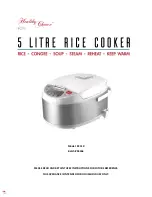
7
The Ovens
During use the appliance becomes hot. Care should
be taken to avoid touching the heating elements
inside the oven.
Before using for the fi rst time, to dispel
manufacturing odours turn the ovens to
230°C and run for an hour. To clear the smell
make sure the room is well ventilated to the
outside air, by opening windows or turning on
a cooker hood for example. We recommend
that people with respiratory or allergy
problems should vacate the area for this brief
period.
The clock must be set to the time of day before the ovens
will work. See ‘The Clock’ section for instructions on
setting the time of day.
1
Turn the oven knob to the temperature you need.
2
The oven indicator light will glow until the oven has
reached the temperature you selected. It will then cycle
on and off during cooking.
3
During cooking, food naturally produces steam,
particulary when cooking foods with high water content
(e.g. oven chips). There may be some steam visible at the
grille at the rear of the hotplate. This is perfectly normal.
As this steam can condense to water droplets on the cool
outer trim of the oven, it may be necessary during cooking
to wipe away any moisture with a soft cloth. This will also
help to prevent soiling and discolouration of the oven
exterior by cooking vapours.
4
The fans in both ovens circulate hot air continuously,
which means faster more even cooking.
The recommended cooking temperatures for a fanned
oven are generally lower than a non-fanned oven.
5
The fan only setting. The fan circulates air inside the
oven but the heating element is not turned on. This setting
is useful for defrosting frozen foods.
Whole chickens and large joints of meat should be
defrosted in the refrigerator. Do not defrost in a warm
oven or whilst the adjoining oven is hot.








































